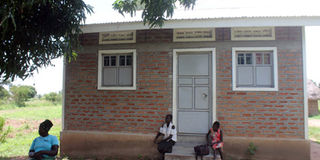Wife dumped for producing sicklers, gets lifeline

Ms Florence Akol with her children outside their house in Okicira Village, Kumi District at the weekend. PHOTO/COURTESY
What you need to know:
- The housing deficit in the country stands at 2.4 million housing units, out of which 210,000 units are in urban areas and 1.395 million in rural areas.
Ms Florence Akol, 36, a mother of three faced it rough when her husband forced her out of their home with her children.
She was accused of producing children with sickle cells. It was real darkness at noon for Akol since she is an orphan.
“It was more than a double tragedy for me. Sickly children and having no accommodation were the two things that made me believe that the world was caving in for me,” the resident of Okicira Village, Agolitome Parish in Kumi District, said.
One of her brothers offered her his grass-thatched kitchen as shelter. However, the mother of three spent most of her time in hospital.
Two years later, Ms Akol received news that her husband had remarried.
“I was lucky that I had a share of land in our home but the challenge was building because sickness consumes the money I get out of farming for treating my two daughters,” she says.
After five years of sleeping under a leaking hut, Habitat for Humanity Uganda, a non-governmental organisation, took over her welfare.
“In 2017, I was picked in our village as one of the most vulnerable people that should be supported. They constructed for me a four-bedroom house, a pit-latrine plus a water tank,” a happy Akol said as she fetched water from the tank.
Her next of kin, Silas Okunya, was also sponsored for a skilling programme and he graduated in carpentry.
“He now helps me take care of treatment. Habitat has raised my status as a responsible lady with a permanent home,” she says.
Like Ms Akol, several people in Kumi District have benefited from the project.
Ms Margaret Omongot, 75, is also among the 630 beneficiaries.
“My children are all peasants and none of them has been able to build such a house. In fact, none of them has a house of this nature because they are poor,” Ms Omongot said.
“It was difficult in the past to sleep under a leaking house when you’re sick. Now I can sleep comfortably and I can assure you that the peace of mind I have will make me live for 100 years,” she said.
Housing deficit
The housing deficit in the country stands at 2.4 million housing units, out of which 210,000 units are in urban areas and 1.395 million in rural areas.
An estimated 900,000 units are substandard and in need of replacement or upgrading.
Going by the projections of our county’s population estimated to be 48 million people by 2022, the country shall require more than 3 million housing units.




